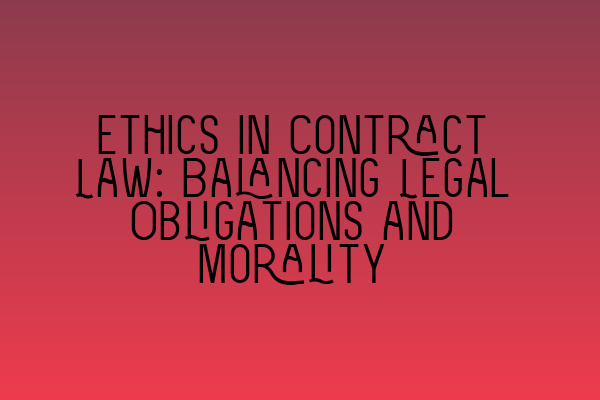Ethics in Contract Law: Balancing Legal Obligations and Morality
When it comes to contract law, the legal profession understands the importance of upholding legal obligations and ensuring that agreements are enforceable. However, contract law does not exist in a vacuum and must also take into account ethical considerations. In this blog post, we will explore the concept of ethics in contract law and discuss how legal professionals can navigate the delicate balance between legal obligations and morality.
Contractual agreements provide the framework for business transactions, personal agreements, and various other arrangements. They serve as a means to establish the rights and responsibilities of the parties involved. However, the mere existence of a contract does not always guarantee its ethical implications. Issues may arise when legal obligations clash with moral values, leading to ethical dilemmas for legal professionals.
One key consideration in contract law ethics is the principle of informed consent. In order for a contract to be valid, all parties must enter into the agreement willingly and with a full understanding of the terms and conditions. This principle ensures that individuals are not coerced or deceived into entering into unfavorable agreements. Legal professionals must ensure that their clients fully comprehend the consequences of their contractual obligations and that they are not taking advantage of vulnerable parties.
Another ethical consideration in contract law is fairness. While the law allows for parties to negotiate terms and conditions, there are limits to what can be deemed fair and reasonable. A contract that unfairly exploits one party at the expense of another may be considered unconscionable. It is the ethical duty of legal professionals to identify and rectify such imbalances in order to uphold the principles of fairness and justice.
The principle of good faith is also paramount in contract law ethics. Parties entering into a contract must act honestly and with integrity. This means refraining from any deceptive practices or misrepresentation that could undermine the validity of the agreement. Legal professionals have a duty to guide their clients in upholding this principle, ensuring that the contract is based on truthful and accurate information.
While contract law primarily focuses on the legal enforceability of agreements, it is essential for legal professionals to recognize that not all unethical behavior is necessarily illegal. In some cases, a contract may be technically valid, but its terms may go against commonly accepted ethical standards. As legal practitioners, it is our responsibility to advise our clients on the ethical implications of their actions and encourage them to align their behavior with societal and moral norms.
To strike the right balance between legal obligations and morality, legal professionals must stay informed and up-to-date on ethical guidelines and best practices. This includes keeping abreast of changes and developments in contract law and ethics. Continuous professional development courses and resources, such as SQE 1 Practice Exam Questions and SQE 2 Preparation Courses, offer valuable insights into ethical considerations in contract law.
In conclusion, ethics play a vital role in contract law by ensuring that legal obligations are balanced with morality. Legal professionals must navigate these complexities while adhering to the principles of informed consent, fairness, and good faith. By integrating ethical considerations into their practice, legal professionals can uphold the integrity of the legal system and maintain trust and confidence in their clients. To learn more about SQE exams and stay updated on the latest SRA SQE Exam Dates, visit our website for SQE 1 and SQE 2 Preparation Courses.
Related Articles:
SQE 1 Practice Exam Questions
SQE 1 Practice Mocks FLK1 FLK2
SQE 2 Preparation Courses
SQE 1 Preparation Courses
SRA SQE Exam Dates
